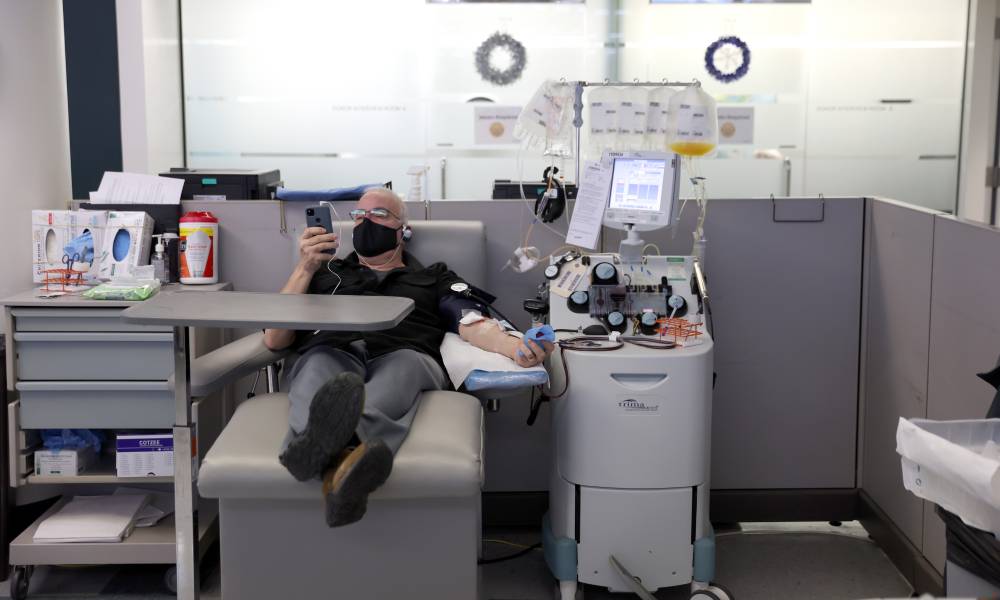US officials urged to throw out discriminatory queer blood ban amid ‘national crisis’

Officials are calling on the FDA to end it’s “discriminatory” queer blood ban. The plea comes after the American Red Cross declares a “national blood crisis”. (Unsplash)
US lawmakers and LGBT+ advocates have called on the Food and Drug Administration (FDA) to throw out its “discriminatory” queer blood ban.
The American Red Cross declared a “national blood crisis” as the country faces its “worst blood shortage in over a decade”.
The Red Cross, in a joint statement with America’s Blood Centers and the Association for the Advancement of Blood and Biotherapies, explained that blood centres reported “less than a one-day’s supply of blood of certain critical blood types”.
In the wake of the blood shortage, several lawmakers and LGBT+ advocates have called on the FDA to lift an effective ban on queer men and others in the LGBT+ community from donating blood.
California congresswoman Katie Porter shared a letter signed by herself and four other colleagues that urged the FDA to end a “discriminatory policy that prevents gay and bisexual men, as well as others in the LGBTQ+ community, from giving blood”.
“We’re in the middle of a national blood shortage, but not everyone who can safely donate blood is allowed to,” Porter wrote on Twitter.
The letter argued that the FDA’s existing recommendation “continues to stigmatise gay and bisexual men” and “undermine crucial efforts to ensure an adequate and stable national blood supply”.
It was signed by Porter, New York congresswoman Alexandria Ocasio-Cortez, Oversight and Reform committee chair Carolyn Maloney and subcommittee on Civil Rights and Civil Liberties chairman Jamie Raskin.
We're in the middle of a national blood shortage, but not everyone who can safely donate blood is allowed to. My colleagues and I are urging @US_FDA to end a discriminatory policy that prevents gay and bisexual men, as well as others in the LGBTQ+ community, from giving blood. pic.twitter.com/fokoG0eyRd
— Rep. Katie Porter (@RepKatiePorter) January 14, 2022
The federal government placed a lifetime ban on men who have sex with men from donating blood in 1983. The ban came at the height of the AIDS crisis in the US.
It wasn’t until 2015 that the total ban was replaced with a one-year abstinence requirement.
The FDA decreased this waiting period in April 2020 amid earlier pandemic-induced blood shortages and backlash from advocates.
Currently, the FDA guidance bars queer men and people who have sex with queer men from donating blood for three months following the most recent sexual contact.
Joni Madison, interim president of the Human Rights Campaign, said the blood shortage crisis could be addressed in part by lifting the FDA’s “discriminatory policy” on queer men donating blood.
“The current policy is outdated, does not reflect the state of the science, and continues to unfairly stigmatise one segment of society,” Madison said.
LGBT+ advocate Jay Franzone told NBC News that the current blood shortage is a “crisis of the FDA’s own making”. Franzone shared that the FDA has the power to change the policy “even temporarily” and could even “do so today”.
“The only thing stopping them is bigotry and fear,” Franzone said.

A man looks at his phone while donating blood at Vitalant blood donation center on 11 January 2022 in San Francisco, California. (Getty/Justin Sullivan)
Over 20 senators have also called on the FDA to lift restrictions on blood donations from gay and bisexual men.
The senators, led by Wisconsin Democrat Tammy Baldwin, addressed the letter to Xavier Becerra, secretary of Health and Human Services, and acting FDA commissioner Janet Woodcock.
The letter declared that any policy that “continues to categorically single out the LGBTQ+ community is discriminatory and wrong”.
It stated: “Given advances in blood screening and safety technology, a time-based policy for gay and bisexual men is not scientifically sound, continues to effectively exclude an entire group of people, and does not meet the urgent demands of the moment.”
The Red Cross warned that, if the nation’s blood supply doesn’t stabilise soon, then “life-saving blood may not be available for some patients when it’s needed”.
Dr Pampee Young, chief medical officer of the Red Cross, promised that the organisation is doing “everything we can to increase blood donations” so all patients can receive the treatments they need.
But Dr Young warned there is only so much the Red Cross can do without more donors”.
The Red Cross reported it had experienced a 10 per cent decline in the number of people donating blood since the beginning of the COVID-19 pandemic.
There has also been ongoing blood drive cancellations and staffing limitations, the Red Cross said. It added that there had been low donor turnout since the delta variant began spreading across the US in August, and this trend has continued as the Omicron variant spreads.

